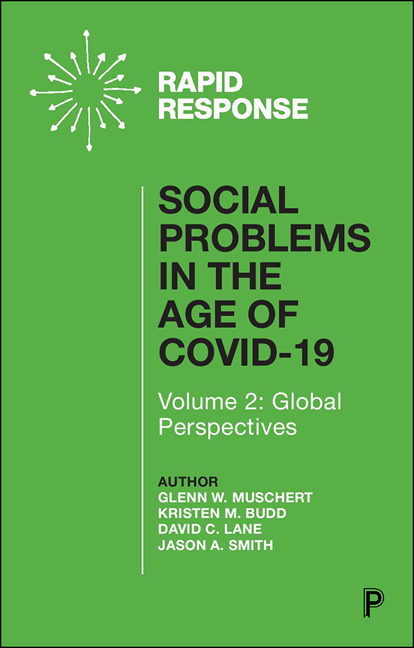Book contents
- Frontmatter
- Contents
- Acknowledgments
- Presidential Welcome
- Editorial Introduction
- 1 Isolation, Economic Desperation, and Exploitation: Human Trafficking and the COVID-19 Crisis
- 2 Uncertainty and Disruption in the Transition to Adulthood During COVID-19
- 3 Disability Rights and Healthcare Rationing during COVID-19
- 4 Social-Distancing the Settler-State: Indigenous Peoples in the Age of COVID-19
- 5 The Pandemic and the Invisible Poor of the Global South: Slum Dwellers in Mumbai, India and Dhaka, Bangladesh
- 6 The Human Right to Water and Sanitation in the Age of COVID-19
- 7 Pandemic Perils of Migrant Workers: Inequalities Intensified
- 8 Food Insecurity and COVID-19
- 9 Protecting Refugee Health and Human Rights in the Context of the COVID-19 Pandemic: Challenges and Pathways to Justice
- 10 COVID-19 Requires an Intersectional Feminist Policy Response
- End Matter
- Afterword
- Index
9 - Protecting Refugee Health and Human Rights in the Context of the COVID-19 Pandemic: Challenges and Pathways to Justice
Published online by Cambridge University Press: 23 March 2021
- Frontmatter
- Contents
- Acknowledgments
- Presidential Welcome
- Editorial Introduction
- 1 Isolation, Economic Desperation, and Exploitation: Human Trafficking and the COVID-19 Crisis
- 2 Uncertainty and Disruption in the Transition to Adulthood During COVID-19
- 3 Disability Rights and Healthcare Rationing during COVID-19
- 4 Social-Distancing the Settler-State: Indigenous Peoples in the Age of COVID-19
- 5 The Pandemic and the Invisible Poor of the Global South: Slum Dwellers in Mumbai, India and Dhaka, Bangladesh
- 6 The Human Right to Water and Sanitation in the Age of COVID-19
- 7 Pandemic Perils of Migrant Workers: Inequalities Intensified
- 8 Food Insecurity and COVID-19
- 9 Protecting Refugee Health and Human Rights in the Context of the COVID-19 Pandemic: Challenges and Pathways to Justice
- 10 COVID-19 Requires an Intersectional Feminist Policy Response
- End Matter
- Afterword
- Index
Summary
The Problem
According to the 2020 annual Global Trends report of the United Nations Refugee Agency (UNHCR), an unprecedented 79.5 million people (1 percent of humanity or one in every 97 people), was displaced, to another country or elsewhere in their country, by conflict, persecution, or events seriously disturbing public order in 2019. The report also demonstrated that the growth of the problem has outstripped solutions, as few of those displaced are able to return to their home country. In the 1990s, an average of 1.5 million refugees were able to return home each year while over the past decade that number has fallen to around 385,000, an indication that refugee status has become a persistent social problem that is becoming exacerbated by COVID-19 pandemic-related international travel restrictions. Recent reports by UNHCR, the UN Office of the High Commissioner for Human Rights (OHCHR), the World Health Organization (WHO), and the UN Secretary-General António Guterres have observed that forced migrants encounter crowded conditions where healthcare, water, and sanitation are often hard to find, and noted that because it is impossible to maintain physical distancing, refugees and asylum-seekers may be especially vulnerable given that COVID-19 is a health crisis.
The current refugee laws and policies arose from situations following World War II and the refugee crises of the interwar years preceding it. For example, Article 14(1) of the Universal Declaration of Human Rights (UDHR), adopted by the UN General Assembly (UNGA) in 1948, guarantees the right to seek asylum in other countries. More recently, refugee health was acknowledged in the Global Compact on Refugees (GCR), adopted by the UNGA on December 17, 2018, after two years of extensive consultations led by UNHCR with member states, international organizations, refugees, civil society, the private sector, and experts. The GCR provides a framework that enhances predictability, equity in responsibility-sharing, and recognition of international cooperation as keys to achieving sustainable solutions to refugee situations. Increasingly harsh migration policies and border closures in response to COVID-19 have trapped people facing persecution and human rights violations and prevented them from seeking asylum. Additionally, lack of pandemic preparedness is noted to have adverse impact on refugees and asylum-seekers living in camps and urban situations, thereby increasing their vulnerability and weakening systems of protection for those fleeing from threats to their lives.
- Type
- Chapter
- Information
- Social Problems in the Age of COVID-19 Vol 2Volume 2: Global Perspectives, pp. 99 - 110Publisher: Bristol University PressPrint publication year: 2020



